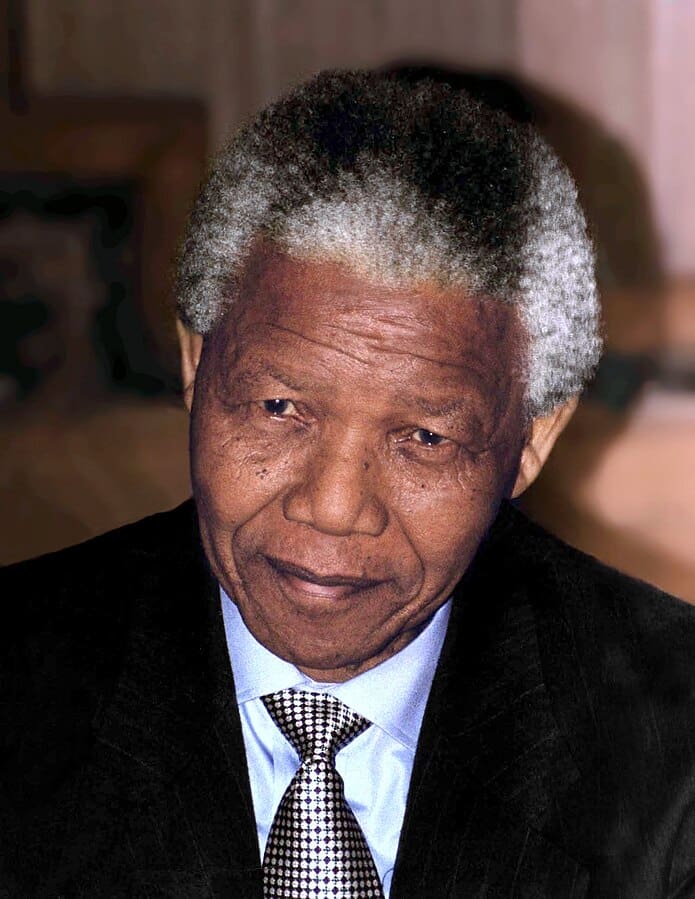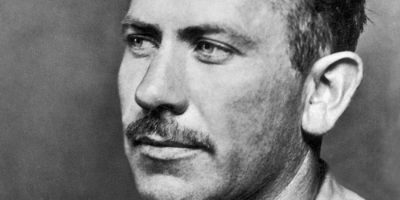Top 50 Leadership Quotes to Inspire You
“The words of great leaders can motivate us to be better. As Mahatma Gandhi said, “Be the change you wish to see in the world.”
I was inspired to create this list of leadership quotes after reading John Fitzgerald Kennedy‘s famous line, “Ask not what your country can do for you, ask what you can do for your country.”
Quotes from visionaries like Nelson Mandela, who said “It always seems impossible until it’s done,” and innovators like Steve Jobs push me to think bigger.
Reviewing these 50 quotes by people who changed history keeps me determined to lead others toward positive change.”
Below are the 50 inspiring leadership quotes.
1. “A Leader is one who knows the way, goes the way, and shows the way.” – John C. Maxwell

Ministerio de Cultura y Deportes Guatemala, CC BY 2.0, John C. Maxwell, via Wikimedia Commons
John C. Maxwell’s quote beautifully captures the essence of leadership exhibited by icons like Mother Teresa, who knew the way to show compassion, went the way by caring for the poor in the slums of Kolkata, and showed the way with her selfless service.
Visionary leaders like Steve Jobs who knew the way to make technology more user-friendly, went the way by revolutionizing personal computing from his parents’ garage in Los Altos and showed the way to integrate innovation with simplicity.
Leaders in fields ranging from civil rights like Martin Luther King Jr. to entertainment like Oprah Winfrey know the way, go the way, show the way – lighting a path for others to create positive change.
2. “Leadership is not about titles, positions, or flowcharts. It is about one life influencing another.” – John C. Maxwell
Courtesy of YouTube
John C. Maxwell pierces appearances to reveal that true leaders are not defined by the trappings of power but by their profound influence on human experience.
Take impoverished leader Nelson Mandela, jailed for 27 years on Robben Island, who through sacrifices shattered apartheid, imbuing hope across South Africa.
Or scientist Jonas Salk, who lacked traditional qualifications but worked tirelessly in a small Pittsburgh lab to develop the polio vaccine – saving millions of lives. Leadership is revealed through those singular visions that bless humanity.
From the quiet mentorship of a teacher uplifting students in a cramped classroom to landmark strides beating back the shadows of suffering in our world – one life-transforming many.
3. “A leader is best when people barely know he exists, when his work is done, his aim fulfilled, they will say: we did it ourselves.” – Lao Tzu
Lao Tzu profoundly captures the essence of quiet leadership that enables others to rise through empowerment rather than control.
Take innovators like Steve Wozniak, who worked diligently behind the scenes to design the Apple I computer that would launch partner Steve Jobs’ renowned career. Or consider the coach of the US Olympic ‘Miracle on Ice’ hockey team, Herb Brooks.
Though out of the spotlight himself, Brook’s unmatched ability to motivate his amateur squad to believe in their potential against all odds brought glory not for him, but for both team and country.
Much like a master violinist blending into the orchestra so as not to upstage the sublime symphony, the most masterful leaders ascend by lifting others beyond the heights they imagine.
4. “Example is not the main thing in influencing others. It is the only thing.” – Albert Schweitzer
Courtesy of YouTube
Albert Schweitzer’s simple yet profound observation captures the core truth that inspiring change is never achieved through empty sermonizing but through the language, all hearts understand—example.
The seminal strides of health pioneer Florence Nightingale, who tenaciously tended soldiers during the Crimean War, established the nursing profession.
The courage of civil rights torchbearer Rosa Parks, whose principled stand on a fateful December day in Montgomery ignited a movement.
The self-sacrifice of Mother Teresa, whose compassion for the forsaken reshaped humanity’s conscience. True visionaries don’t just tell—they show. These leaders still stir hearts today because their lives spoke what volumes of words could never convey.
5. “Leadership is solving problems. The day soldiers stop bringing you their problems is the day you have stopped leading them.” – Colin Powell
Colin Powell’s quote elegantly distills that true leadership lies in tackling challenges that hamper those we guide, not resting in comfort.
The pioneering path of medical researcher Jonas Salk epitomizes this – he tirelessly addressed the daunting riddle of polio to save countless children from death or paralysis.
Or wartime British Prime Minister Winston Churchill, who resolutely strategized against the Nazi blitz plaguing London into submission. The mettle of a leader is measured by perseverance in confronting adversity, not platitudes that mask reality to maintain calm.
As Powell suggests, people quickly see through inaction masquerading as tranquility. The spearhead of progress remains problem-solvers – like Gandhi, Kennedy, and Jobs – pursuing solutions to empower those they lead.
6. “The supreme quality for leadership is unquestionably integrity. Without it, no real success is possible.” – Dwight D. Eisenhower
Courtesy of YouTube
Dwight D. Eisenhower‘s assertion underscores the foundational role of integrity in leadership. Historical figures like Abraham Lincoln, whose unwavering commitment to justice during the Civil War exemplified integrity, showcase its enduring impact.
In business, the success of figures like Warren Buffett and Bill Gates rests on their unblemished reputations, emphasizing how integrity is intrinsic to sustained achievement.
The Watergate scandal tarnished Richard Nixon’s legacy, illustrating that lack of integrity undermines even the highest office.
From Mahatma Gandhi to Nelson Mandela, global leaders who upheld integrity left indelible marks on history, affirming Eisenhower’s belief that genuine success in leadership hinges on unwavering integrity.
7. “The price of greatness is responsibility.” – Winston Churchill#
Courtesy of YouTube
The prolific leader Winston Churchill grasps leadership’s indelible code – advancement bears a burden. The sentinel stars guiding humanity’s ascent demonstrate this maxim at every turn.
A good example is the pioneering responsibility assumed by vaccine developer Jonas Salk, who could have pocketed a billion dollars for his polio cure but insisted it should be patent-free so no parent needs to agonize over buying their child’s life.
Another example is NASA trailblazer Katherine Johnson, whose tireless trajectory calculations guaranteed safe passage for astronauts circling uncharted space frontiers, exemplifying the challenges facing all Magellans charting undiscovered realms.
True vision pays a toll in sweat and sleepless nights, which Churchill knew leading Britain against a blitzkrieg barrage. But selfless sacrifice seeds new mornings, unveiling unforeseen vistas.
8. “Great leaders are almost always great simplifiers.” – Colin Powell
Colin Powell pinpoints simplification as integral to spearheading change—a skill exemplified in reformers like Florence Nightingale.
Confronting the disarray of British military hospitals, she cut through antiquated medical clutter by pioneering streamlined care, vastly boosting survival rates.
Or conservationist Jane Goodall, who carefully documented chimps using basic tools like sticks for termite fishing amidst Africa’s dense jungles, fundamentally transforming science’s separation of man and beast.
Indeed, from Susan B. Anthony’s clear appeals that won women’s right to vote, to coach Vince Lombardi’s endlessly repeated fundamentals undergirding the Packers dynasty, history’s heroes lead through uncluttering fields of complexity to illuminate eloquent solutions.
9. “Lead from the heart, not the head.” – Princess Diana
Courtesy of YouTube
Princess Diana‘s wisdom, urging leadership from the heart, finds resonance in leaders who prioritized empathy over mere rationality. Mahatma Gandhi, through nonviolent resistance, led with compassion, transforming nations.
Nelson Mandela’s commitment to reconciliation over revenge in post-apartheid South Africa embodied leading with the heart. Mother Teresa, driven by compassion, devoted her life to humanitarian work, demonstrating a heartfelt approach to leadership.
In the political realm, Franklin D. Roosevelt’s empathy during the Great Depression connected him with the American people.
Princess Diana’s sentiment aligns with these luminaries, highlighting that impactful leadership transcends calculations, instead embracing the genuine emotions that drive positive change.
10. “The key to successful leadership today is influence, not authority.” – Kenneth Blanchard
Kenneth Blanchard strikes at an essential truth – coercion fails where inspiration succeeds. Gandhi overturned an empire through nonviolent influence, not legal authority.
Rosa Parks likewise drew strength from conviction rather than official sanction, catalyzing history by declining her bus seat. Scientific pioneers too like Marie Curie broke astonishing ground without formal position, her slavish devotion expanding humanity’s knowledge horizon.
Even in business, moguls like John Mackey shifted commerce by pursuing higher ideals than profit, compelling through ethical influence.
Leadership in every age reveals authority’s insufficiency for motivating humankind’s highest potential – only vision’s authentic magnetism elicits such excellence. For heart-to-heart pulse, not external titles, proves the persuasive power behind lasting achievement.
11. “A leader takes people where they want to go. A great leader takes people where they don’t necessarily want to go but ought to be.” – Rosalynn Carter
Courtesy of YouTube
Rosalynn Carter discerns that while many leaders may take people down easy paths, truly great ones guide them through challenges into growth.
Galvanizers of social change like Martin Luther King . modeled this – confronting injustice however daunting for both himself and the nation.
Revolutionary thinkers too like scientist Marie Curie defied both convention and arduous effort in her solitary study of radioactivity.
Undeterred by role limitations as a woman or the financial ones of two young daughters, her willingness to weather all obstacles on the path toward human progress expanded scientific horizons.
Great leaders in every age – from civil rights to space frontiers, inner-city classrooms to executive office suites – uplift by urging past the status quo into unforeseen possibility.
12. “Leadership is the capacity to translate vision into reality.” – Warren Bennis
Warren Bennis captures exemplary leadership as manifesting vision beyond abstraction – a feat epitomized in revolutionaries like botanist Luther Burbank, who tamed prickly cacti into edible fruit, and fragile lilies into dazzling new hybrids.
Despite lacking formal training, Burbank’s pioneering vision birthed over 800 plant species. Equally, architect Frank Lloyd Wright framed radically innovative building concepts once deemed impossible, his Fallingwater triggering architecture’s sea change.
Even entrepreneurs like Oprah Winfrey and Walt Disney made fantasy tangible, building entertainment empires from small-town dreams.
True leaders – whether in scientific, creative, or business domains – are defined by the vastness of realized achievement wrought from sparks of inner conviction alone.
13. “If your actions inspire others to dream more, learn more, do more, and become more, you are a leader.” – John Quincy Adams
Courtesy of YouTube
John Quincy Adams‘ criterion for leadership emphasizes inspiration, as witnessed in leaders like Eleanor Roosevelt, whose advocacy for human rights inspired societal progress.
In the realm of science, Marie Curie’s groundbreaking work spurred curiosity and learning. Business magnate Elon Musk, through his ventures, encourages audacious dreams and continuous innovation.
Malala Yousafzai, championing girls’ education, motivates others to learn and strive for change. The artistic sphere sees leaders like Leonardo da Vinci, whose multifaceted genius continues to inspire creativity.
These figures, each in their domain, personify Adams’ notion that true leadership sparks aspirations, learning, action, and personal growth in those they influence.
14. “I cannot give you the formula for success, but I can give you the formula for failure, which is: Try to please everybody.” – Herbert Swope
Herbert Swope’s wisdom underscores the futility of attempting universal appeasement. Leaders who thrived understood this, like Winston Churchill, whose resolute decisions during wartime weren’t universally popular but crucial for victory.
In the corporate arena, Steve Jobs’ uncompromising vision at Apple faced criticism, yet yielded groundbreaking innovation. Margaret Thatcher‘s steadfast policies, known as the “Iron Lady,” attracted both acclaim and opposition.
These leaders, unswayed by the pursuit of pleasing everyone, instead pursued decisive paths, leaving indelible marks on history by prioritizing their principles over fleeting popularity.
15. “A great person attracts great people and knows how to hold them together.” – Johann Wolfgang Von Goethe
Courtesy of YouTube
Goethe’s words inspire by capturing leadership not as a solo spotlight performance, but as a symphony of diverse excellence drawn together in harmony.
Master painter Vincent Van Gogh lived this, summoning swirling creativity around his Provençal haven, mentoring pioneering post-Impressionists like Gaugin and Cézanne into brighter palettes.
Equally, trailblazing entrepreneur Sam Walton brewed genius by fostering a culture of heartland diversity at Walmart, valuing every worker’s contribution.
Even in science, Jonas Salk sparked the brilliance of many by working alongside colleagues for seven years, tirelessly nurturing their joint effort until finally uncovering the elusive polio vaccine.
Indeed, the most luminous stars in every field – arts, commerce, civil rights – attracted and aligned talents, proving how shared vision multiplies individual ability beyond measure when bonded by inspirational leadership.
16. “Leaders aren’t born, they are made. And they are made just like anything else, through hard work. And that’s the price we’ll have to pay to achieve that goal or any goal.” – Vince Lombardi
The gridiron titan Vince Lombardi stands among history’s most rousing leaders for grasping leadership’s bedrock blueprint lies not in genetics or luck – but in unrelenting grit transforming ability into excellence.
Famous pioneers modeled this drive in fighting old guard resistance to prove possibility, be it Amelia Earhart ascending among clouds of sexism or Walt Disney sketching relentlessly in his garage studio during early failures, ultimately building magical kingdoms where skepticism once scoffed.
From fiery feminist Gloria Steinem to space-dreaming sci-fi author Octavia Butler, every ceiling shattered and social barrier broken echoes Lombardi’s truth – achievement flows from inner mettle, the tireless will to master skies both within and without.
True leading means ascending beyond limits – flying in the face of earthbound convention. Wings emerge under heavy pressure, slowly shaping soft dreams into hardened form.
17. “Leadership is about making others better as a result of your presence and making sure that impact lasts in your absence.” – Sheryl Sandberg
Courtesy of YouTube
Sheryl Sandberg’s quote resonates as a beacon of inspirational leadership, emphasizing the transformative impact leaders can have on others. Bill Gates, through philanthropy, seeks to improve global health and education, ensuring a lasting positive impact.
In technology, Tim Cook’s tenure at Apple, following Steve Jobs, has sustained the company’s innovation and influence. In sports, Serena Williams inspires and elevates her peers, leaving a lasting legacy.
Pope Francis, with a commitment to social justice, embodies the idea of bettering others through leadership. These diverse figures exemplify the enduring influence that defines impactful leadership, echoing Sandberg’s powerful perspective.
18. “Leadership is the key to 99 percent of all successful efforts.” – Erskine Bowles
Erskine Bowles’ assertion underscores leadership’s pivotal role in success. Elon Musk’s entrepreneurial vision has propelled SpaceX and Tesla to unprecedented heights, showcasing the power of transformative leadership.
In finance, Warren Buffett’s astute decision-making has guided Berkshire Hathaway to sustained prosperity. Oprah Winfrey’s media empire and philanthropic endeavors exemplify leadership’s impact across diverse domains.
Jeff Bezos, the architect of Amazon’s success, demonstrates how visionary leadership can reshape industries.
These figures, through their distinct fields, illuminate the centrality of leadership in achieving remarkable feats, validating Bowles’ perspective that effective leadership is the linchpin for success in myriad endeavors.
19. “Leadership is not wielding authority. It’s empowering people.” – Becky Brodin
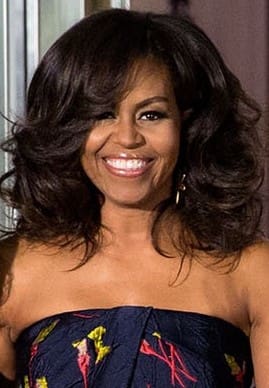
Lawrence Jackson, Michelle Obama, Public domain, via Wikimedia Commons
Becky Brodin’s quote encapsulates a paradigm shift in leadership, emphasizing empowerment over authority. Bill and Melinda Gates, through the Gates Foundation, empower communities globally by addressing health and education challenges.
In technology, Sundar Pichai fosters innovation at Google by empowering employees to explore creative solutions. Michelle Obama‘s initiatives, like Let’s Move, empower youth to embrace healthier lifestyles.
Ellen DeGeneres, known for her philanthropy and advocacy, empowers marginalized voices through her platform.
These leaders embody Brodin’s philosophy, showcasing that true leadership is about fostering an environment where individuals are empowered to contribute and thrive.
20. “My job is not to be easy on people. My job is to make them better.” – Steve Jobs
Steve Jobs’ quote reflects a challenging yet transformative leadership style, prioritizing growth over comfort.
In technology, Elon Musk’s demanding leadership at SpaceX and Tesla pushes boundaries, resulting in groundbreaking achievements.
In sports, coach Vince Lombardi’s rigorous approach with the Green Bay Packers forged a dynasty. Fashion icon Anna Wintour’s exacting standards at Vogue exemplify a commitment to excellence.
These leaders, unafraid to challenge and elevate those around them, embody Jobs’ philosophy of fostering improvement through a demanding yet ultimately enriching leadership style.
21. “Great leaders are not defined by the absence of weakness, but rather by the presence of clear strengths.” – John Zenger
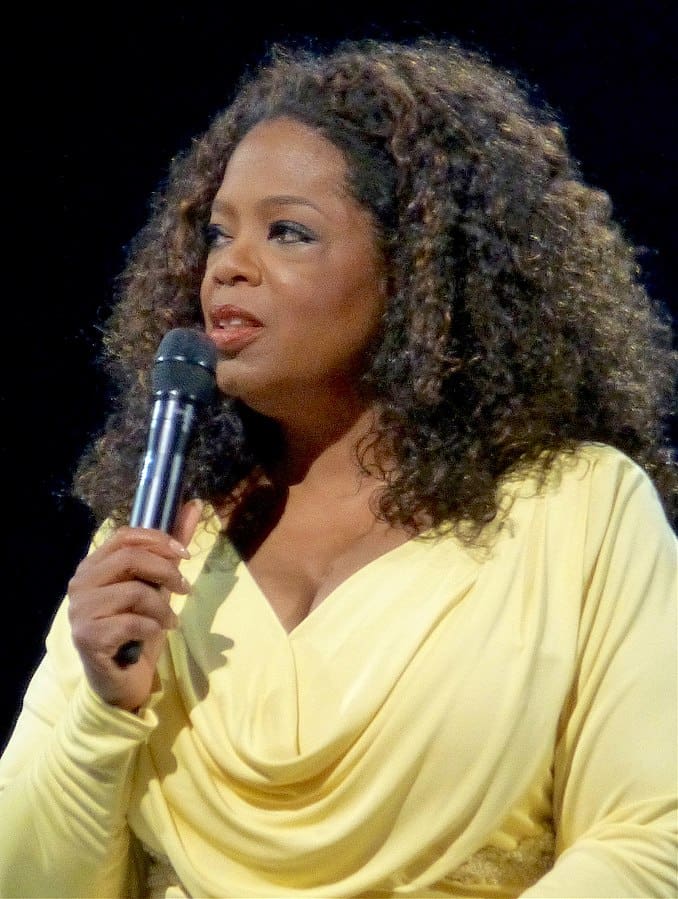
https://www.flickr.com/photos/aphrodite-in-nyc, CC BY 2.0, Oprah Winfrey, via Wikimedia Commons
John Zenger’s quote highlights the essence of leadership: a focus on strengths rather than fixating on weaknesses. In technology, Jeff Bezos leveraged his visionary strength to revolutionize e-commerce through Amazon.
Warren Buffett, a financial luminary, excelled by capitalizing on his investment acumen. Media mogul Oprah Winfrey‘s strength in communication and empathy propelled her to unparalleled success.
Elon Musk, through his innovation prowess, exemplifies Zenger’s perspective. These leaders showcase that greatness lies not in flawlessness but in amplifying and leveraging one’s distinct strengths to drive impactful change and success.
22. “You take people as far as they will go, not as far as you would like them to go.” – Jeanette Rankin
Jeanette Rankin’s quote, “You take people as far as they will go, not as far as you would like them to go,” underscores the importance of understanding and respecting the individual capacities of those you lead.
It emphasizes that effective leaders recognize the potential within others and nurture their growth rather than forcing them to conform to unrealistic expectations.
This approach is exemplified by leaders like Walt Disney, who fostered creativity and innovation among his employees, and Abraham Lincoln, who recognized the strengths of his generals and empowered them to lead.
Their ability to empower others enabled them to achieve remarkable feats.
23. “Average leaders raise the bar on themselves; good leaders raise the bar for others; great leaders inspire others to raise their own bar.” – Orrin Woodward
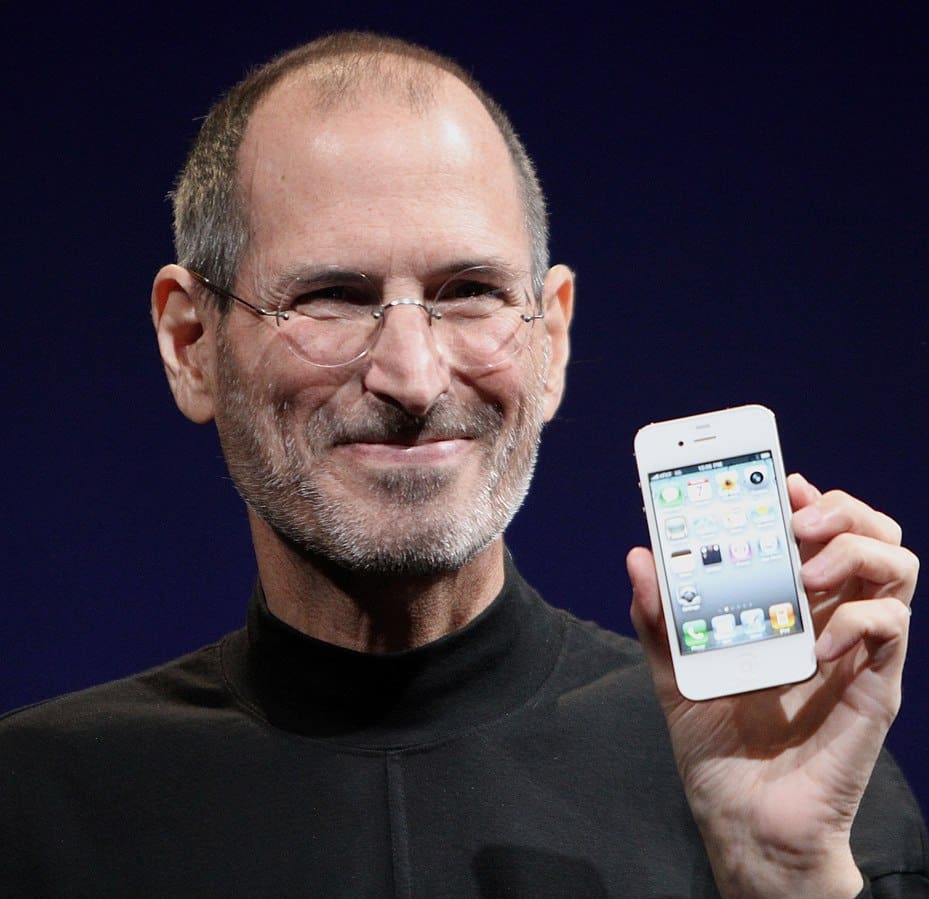
Matthew Yohe, CC BY-SA 3.0, Steve Jobs, via Wikimedia Commons
Orrin Woodward eloquently captures how the greatest leaders uplift others to excel.
While average leaders simply better themselves and good leaders directly motivate improvement in their teams, the most inspiring figures transform attitudes and cultures by kindling the inner spark within each individual.
From pioneering female CEOs like Mary Barra stirring younger women to shatter corporate glass ceilings, to visionaries like Steve Jobs who made “think different” Apple’s mantra to unleash creativity, such leaders have liberated human potential on mass scales.
Whether historic icons whose legends still spur progress today or modern trailblazers paying ideals forward, Woodward’s words ring true across those who raised bars well beyond their own by stirring greatness in hearts and minds.
24. “Don’t blow off another’s candle for it won’t make yours shine brighter.” – Jaachynma N.E. Agu
Jaachynma N.E. Agu eloquently captures the essence of inspired leadership – uplifting others rather than tearing them down. Leaders like Ruth Bader Ginsburg, who fought tirelessly for gender equality without vilifying opponents, exemplified this.
Muhammad Yunus pioneered microfinance to lift up impoverished people rather than exploit them for personal gain. Rachel Carson raised awareness about environmental crises through impassioned writing rather than finger-pointing.
These leaders and others focused on increasing light rather than cursing the darkness. They rose by raising others and inspiring solidarity, not sowing divisiveness – the core truth in Agu’s inspiring observation on preserving candles rather than extinguishing them. Their vision strengthened humanity’s shared light.
25. “Great leaders create more leaders, not followers.” – Roy T. Bennett
Courtesy of YouTube
Roy T. Bennett eloquently captures how transcendent leaders empower others. Rather than cultivate dependency, history-shaping figures like feminist foremother Susan B. Anthony incubated future champions including Carrie Chapman Catt to advance the suffrage movement.
Daniel Inouye, a decorated WWII combat medic, continued serving for decades in Congress while guiding fellow Asian Americans including Daniel Akaka into public leadership.
Songwriter Bob Marley touched millions and spread Rastafarian vision far beyond music by enabling cohorts to grow reggae worldwide.
Whether suffrage, civil rights, or artistic icons, Bennett’s quote recognizes great leaders’ future-focused drive to develop talent rising all around them.
They ignite movements by raising surrounding waves, not centralized cults of personality.
26. “The task of leadership is not to put greatness into humanity, but to elicit it, for the greatness is already there.” – John Buchan
John Buchan’s quote illuminates leadership not as domineering, but as uplifting the light already within people. Gandhi knew the capacity for nonviolent civil resistance already resided among India’s masses—his role was coaxing it forth.
Likewise, suffragists like Alice Paul recognized innate gender equality; through organizing and unifying efforts elicited society’s inherent sense of justice until women’s right to vote became a reality.
Beyond politics, environmentalist Wangari Maathai tapped into ecological care intrinsic across Africa by inspiring communities to nurture and plant trees by the millions.
Buchan suggests great leaders are midwives of human potential; through care and skill help brilliance being obscured comes forth. Not conferred from above but drawn out through resonance with innate goodness in all.
27. “You learn far more from negative leadership than positive leadership. Because you learn how not to do it.” – Norman Schwarzkopf
Courtesy of YouTube
Norman Schwarzkopf pinpoints a counterintuitive truth on leveling up leadership: examining poor examples shows what not to do. Activist Bayard Rustin studied strategies of Indian resistance that failed to spark global support, guiding Martin Luther King Jr toward mass media-friendly civil rights protests.
Disney’s founders lost early cartoon studios to unethical business partners, learning to safeguard creativity and IP going forward. Parton scrutinized the exploitative country music industry treatment of women artists, vowing to build an empowering paradigm in her ascent.
Turning negatives into education, these leaders wove hard-learned lessons into positive blueprints empowering people. By recognizing the impact potential of both positive and negative exemplars, they turned wisdom into inspiration benefitting millions.
28. “Anyone can hold the helm when the sea is calm.” – Publilius Syrus
In this profound observation, ancient Roman writer Publilius Syrus captures distinguishing great leadership from simply fair weather management.
Hemingway steadfastly shepherded expatriates in wartime Paris, Admiral Grace Hopper navigated unrelenting sexism to revolutionize computer programming, and Lincoln resolved a nation collapsing inwards over slavery—such figures held fast to convictions steering humanity forward during surrounding storms.
More than power, rank, or charisma, Syrus suggests true leadership reveals itself in crisis: those able to maintain ethical compasses and enlist others toward justice when chaos would divert lesser figures.
Vision persisting not despite adversity but through using it for moral direction—that illuminates inspiring leadership in any era.
29. “The mediocre leader tells. The good leader explains. The superior leader demonstrates. The great leader inspires.” – William A. Ward
Courtesy of YouTube
William A. Ward discerns great leadership’s power to show rather than merely tell new possibilities.
Botanist Wangari Maathai didn’t just advocate environmental justice in Kenya, she mobilized networks of women to plant millions of trees, making grassroots activation possible.
Rather than vaguely oppose apartheid, students Emmeline and Christine Pankhurst directly confronted authorities through peaceful Sit-Down protests, courageously modeling civil resistance. Beyond stirring rhetoric, great leaders make ideals real by daring action.
Like Rachel Carson building scientific and moral arguments against pesticides through the landmark Silent Spring, such figures crystallize movements through ground-level deeds, not from atop abstract soapboxes. Their bold risks decode and vividly illustrate better futures worth fighting for.
30. “Become the kind of leader that people would follow voluntarily; even if you had no title or position.” – Brian Tracy
Courtesy of YouTube
Brian Tracy profoundly identifies leadership that emerges not by mandate but by inspiration to transform. Before captaining historic boycotts, Rosa Parks developed a rapport with the community by mentoring youth and supporting causes like Scottsboro Boys’ defense.
Tracy’s quote finds life in towering figures, but also everyday heroes – like Texas convenience store manager Imran Yousuf single-handedly saving dozens from a mass shooter through compassion and decisive action though lacking any “title or position.”
True leadership sparks others to rise through hope’s contagion, not position’s authority.
From Park’s kindling civil rights movement through building understanding person-to-person; to Yousuf’s spur-of-moment bravery to protect strangers, Tracy recognizes the power to uplift embedded in all willing to stand for right.
31. “A good leader takes a little more than his share of the blame, a little less than his share of the credit.” – Arnold H. Glasow
Glasow elegantly distills years of wisdom into a guiding light for accountable leadership.
Amidst prevailing gender discrimination in science limiting her credit, physicist Chien-Shiung Wu still readily accepted blame for the mistakes of her predominantly male research staff, creating an unusually equitable workspace that bolstered all members’ careers.
Similarly, vaccinologist Maurice Hilleman assumed accountability for rare side effects of his revolutionary measles vaccines while crediting collective scientific efforts, ultimately minimizing harm through responsibility while protecting public health advances benefiting millions.
By pragmatically letting impact eclipse ego, such selfless figures built cultures of empowerment and progress far greater than any personal accolades. Glasow recognizes how leadership stability comes not through control but through humility’s grace.
32. “When the effective leader is finished with his work, the people say it happened naturally.” – Lao Tzu
Courtesy of YouTube
In this pithy observation, Lao Tzu distills great leadership’s art: guiding change by tapping into the collective consciousness, not imposing top-down.
Gandhi awakened India’s spirit for sovereignty, not through elaborate strategizing but through basic salt marches resonating with people’s longing for liberation.
Unlike authoritarian rulers, visionaries like Franklin D. Roosevelt lifted everyday spirits through fireside chats kindling the belief better futures were not only necessary but inevitable.
Mother Teresa gently overturned generations of dehumanization not through sweeping spectacle but small comforts affirming dignity in society’s crevices.
Such leaders merged imagination with innate longing until justice seemed not only possible but destined. By stirring currents already flowing in people’s hearts, they made epic change feel as natural as rising tides.
33. “The greatest leader is not necessarily the one who does the greatest things. He is the one that gets the people to do the greatest things.” – Ronald Reagan
Ronald Reagan identifies how transcendent leadership catalyzes collective potential—the visionary’s art of empowering followers to achieve more than they imagined possible.
Mohandas Gandhi awakened the Indian independence movement by igniting everyday citizens’ courage through nonviolent civil disobedience unimaginable before.
Likewise, barrier-breaking leaders from Frida Kahlo to Loretta Lynn redefined culture by emboldening women’s expression against sterilizing norms. Though spearheading movements under their names, their greatness lay in liberating agency in others.
Reagan recognizes such figures’ enduring genius not in solitary feats, but in mass advancement achieved by awakening hidden heroism across society to transform history. Their light shone through kindling sparks in those around them.
34. “Good leaders develop through a never-ending process of self-study, education, training, and experience.” – Tom Landry
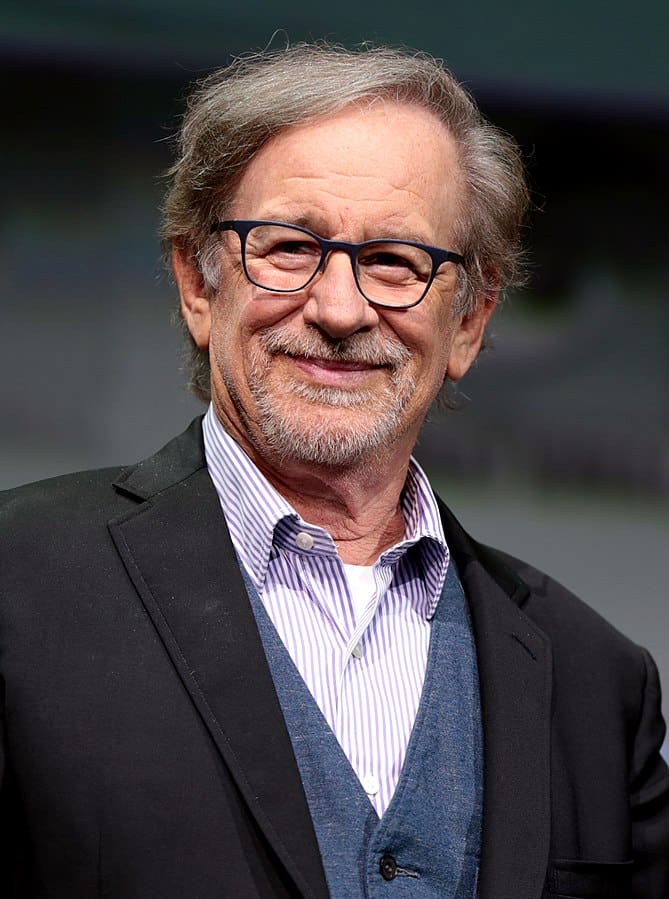
Gage Skidmore, CC BY-SA 3.0, Steven Spielberg, via Wikimedia Commons
Tom Landry aptly notes that exemplary leadership is a ceaseless journey of reflective self-improvement.
Scientist Marie Curie broke relentless barriers not through infallible genius alone but sustained scholarliness, learning from other researchers to deepen discovery frontiers even as an established Nobelist.
After directing iconic films spotlighting oppression, Steven Spielberg kept educating himself on diverse perspectives to fuel increasingly meaningful impact through art.
By perpetually striving beyond comfort zones of knowledge for wisdom advancing social change, such leaders modeled that greatness lies not in perfection but in purpose, grit, and openness to insight.
They exemplified Landry’s observation on leadership as an unfinished odyssey shaped by a tenacious commitment to growth and understanding.
35. “The growth and development of people is the highest calling of leadership.” – Harvey Firestone
Identifying leadership’s purpose as cultivating human potential, Harvey Firestone articulates an aspirational north star for guiding society’s growth.
From pioneering educator Booker T. Washington uplifting future generations of Black scholars, to the Dalai Lama transcending exile to spearhead global empathy and self-actualization programs, to Frida Kahlo’s cultural leadership emboldening exploration of identity’s complexities, such figures made unlocking and amplifying marginalized voices their life’s work.
They centered on lifting diverse talents rather than consolidating power. Firestone would surely find their efforts wonderfully answering his vision of leadership not as a mantle of prestige, but a daily practice of fanning the sparks in others to blaze.
36. “A leader is a dealer in hope.” – Napoleon Bonaparte
Courtesy of YouTube
Napoleon’s quote casts visionary leaders as merchants of hope’s currency, bankrolling dreams of better futures even amidst surrounding despair.
Martin Luther King, Jr. offered weary civil rights activists sustaining faith in equality’s inevitability, despite bigotry’s deep entrenchment. Cesar Chavez joined exploited migrant laborers in fasting for justice, reigniting depleted reserves of courage.
Nelson Mandela endured prison’s bleak confines while stoking worldwide currents against apartheid, emerging to lead South Africa’s rebirth.
During humanity’s darkest passages, such figures dealt not just with strategic plans but resonant rhetoric and unifying imagery, driving change through rekindling imagination’s spark.
Bonaparte recognized how dream dealers who revive optimism and ambition can redeem almost any bankruptcy of morale.
37. “I start with the premise that the function of leadership is to produce more leaders, not more followers.” – Ralph Nader
Ralph Nader incisively observes visionary leadership’s propagation beyond any individual to exponentially expand empowerment.
Burgeoning into movements far greater than solitary struggles, figures like Emmeline Pankhurst and Gloria Steinem built sisterhoods of support raising up activist talent, from speaking to organizing to fundraising and beyond.
Community organizers like Cesar Chavez trained legions of union leaders to campaign for labor rights. More than spearheading single organizations, Nader notes how such vanguards incubated interconnected ecosystems of change-makers to continue cascading waves of progress.
Rather than contain power in insular cults of personality, they rippled agency ever outward through interlinked models of motivation and uplift that changed history’s tide.
38. “A true leader has the confidence to stand alone, the courage to make tough decisions, and the compassion to listen to the needs of others.” – Douglas MacArthur
Courtesy of YouTube
General Douglas MacArthur discerns true leaders by their integrity and empathy as much as prowess. As an AIDS researcher, Dr. Fauci braved scorn to champion compassion and facts saving innumerable lives.
Working within unjust systems, the legal courage of Thurgood Marshall and Ruth Bader Ginsburg drove civil rights and gender equality milestones to stand the tests of time.
Spearheading nonviolent protest amidst retaliation risks, Martin Luther King, Jr. drew strength through spiritual faith and embracing shared humanity to redeem America’s founding promise of equality.
MacArthur’s quote finds embodiment in such moral giants, who led groundbreaking reforms through lonely conviction, wise guidance, and extending society’s circles of concern.
39. “Leadership is not about being in charge. It’s about taking care of those in your charge.” – Simon Sinek
Simon Sinek’s quote, “Leadership is not about being in charge. It’s about taking care of those in your charge,” resonates with its emphasis on servant leadership.
Effective leaders embody this philosophy, such as Eleanor Roosevelt, who, as First Lady, championed social causes and advocated for human rights. Herb Kelleher, co-founder of Southwest Airlines, prioritized employee well-being, fostering a culture of care and teamwork.
This quote captures the essence of leaders like Roosevelt and Kelleher, underscoring the transformative power of leadership that prioritizes the needs and growth of the individuals within an organization.
40. “Before you are a leader, success is all about growing yourself. When you become a leader, success is all about growing others.” – Jack Welch
Courtesy of YouTube
Jack Welch’s quote encapsulates the profound shift in leadership focus from personal development to empowering others. Bill Gates embodies this ethos, transitioning from building Microsoft to philanthropy, empowering global communities.
Oprah Winfrey, as a media mogul, dedicated her influence to uplifting diverse voices and fostering personal growth.
Welch’s wisdom finds resonance in leaders like Gates and Winfrey, highlighting the transformative impact of leaders who recognize that true success lies not just in personal achievements but in the ability to cultivate and elevate the potential of those they lead.
41. “Effective leadership is not about making speeches or being liked; leadership is defined by results not attributes.” – Peter Drucker
Peter Drucker’s quote, “Effective leadership is not about making speeches or being liked; leadership is defined by results not attributes,” emphasizes substance over superficial qualities.
Indira Nooyi, former PepsiCo CEO, exemplifies this, driving financial performance through strategic decisions. Angela Merkel‘s pragmatic leadership, navigating challenges for Germany’s benefit, aligns with Drucker’s focus on tangible outcomes.
Drucker’s wisdom echoes in leaders like Nooyi and Merkel, who prioritize delivering concrete results over seeking popularity, showcasing the enduring impact of leaders whose actions speak louder than words.
42. “The best leaders are those most interested in surrounding themselves with assistants and associates smarter than they are.” – John C. Maxwell
Courtesy of YouTube
John C. Maxwell’s quote emphasizes the wisdom of leaders who prioritize surrounding themselves with brilliance, recognizing the power of a diverse and talented team.
Bill Gates, co-founder of Microsoft, surrounded himself with brilliant minds, fostering innovation and success. Michelle Obama, as First Lady, surrounded herself with experts to drive impactful initiatives.
Maxwell’s insight is reflected in leaders like Gates and Obama, illustrating the transformative potential when leaders actively seek and embrace the intelligence and expertise of those around them, fostering an environment of continuous learning and collective achievement.
43. “Leadership is not about being in control. It’s about making a difference.” – Unknown
The unknown quote resonates as it redefines leadership, emphasizing impact over control. Nelson Mandela exemplifies this, transforming South Africa through reconciliation rather than dominance.
Malala Yousafzai, advocating for girls’ education, showcases leadership in making a societal difference. The quote aligns with the ethos of Mandela and Yousafzai, highlighting that true leaders prioritize positive change, influence, and contribution over authoritarian control.
It underscores the essence of leadership as a force for meaningful impact and positive transformation, inspiring others to follow suit.
44. “Leadership is the capacity to influence others through inspiration, motivated by a passion, generated by a vision, produced by a conviction, ignited by a purpose.” – Myles Munroe
Courtesy of YouTube
Myles Munroe‘s quote defines leadership as a potent blend of inspiration, passion, vision, conviction, and purpose, encapsulating the essence of transformative influence.
Martin Luther King Jr., driven by a vision of racial equality, inspired a nation with his impassioned speeches and unwavering conviction. Aung San Suu Kyi, advocating for democracy in Myanmar, exemplifies leadership fueled by a deep sense of purpose.
Munroe’s insight echoes in the legacies of King and Suu Kyi, illustrating that impactful leadership arises from a fusion of inspiration and a profound commitment to a purpose that transcends personal aspirations.
45. “You don’t lead by pointing and telling people some place to go. You lead by going to that place and making a case.” – Ken Kesey
Ken Kesey’s quote underscores the essence of leading by example and persuasion rather than mere directives.
Mahatma Gandhi embodied this, marching alongside followers in India’s independence movement, making a compelling case for nonviolence. Nelson Mandela, through his actions in the anti-apartheid struggle, exemplified leadership by personal commitment.
Kesey’s wisdom finds resonance in leaders like Gandhi and Mandela, showcasing the transformative power of those who actively participate in the journey they advocate, offering a compelling case through their deeds rather than relying solely on words or commands.
46. “Becoming a leader is synonymous with becoming yourself. It is precisely that simple, and it is also that difficult.” – Warren Bennis
Courtesy of YouTube
Warren Bennis’ quote underscores the transformative nature of leadership, where authenticity and self-discovery are integral. Steve Jobs exemplified this quality, aligning Apple’s vision with his innovative persona.
Sheryl Sandberg, as Facebook’s COO, advocated for authenticity, promoting diversity and resilience. Bennis’ insight is mirrored in leaders like Jobs and Sandberg, illustrating the challenging yet essential process of leadership development.
By becoming true to themselves, these leaders have left an enduring mark, demonstrating that genuine leadership is about embracing one’s identity and fostering an environment where others can do the same.
47. “The best leaders are willing to sacrifice their own personal interests for the good of the team.” – John Wooden
John Wooden’s quote encapsulates selflessness as a cornerstone of effective leadership. Mother Teresa, renowned for her humanitarian work, exemplified this by prioritizing the needs of the vulnerable over personal comforts.
Winston Churchill, during World War II, sacrificed personal ease for the greater good of the nation.
Wooden’s wisdom finds resonance in leaders like Mother Teresa and Churchill, emphasizing that true leaders prioritize collective welfare, inspiring through their willingness to put the team’s interests above their own.
This quote underscores the transformative impact of leaders who lead with a genuine commitment to the well-being of those they serve.
48. “The function of leadership is to produce more leaders, not more followers.” – Ralph Nader
Courtesy of YouTube
Ralph Nader’s quote illuminates leadership as a catalyst for empowering others, transcending the traditional hierarchical model. Mahatma Gandhi, by fostering a cadre of independent leaders, ignited India’s path to independence.
Nelson Mandela’s focus on leadership development in post-apartheid South Africa exemplifies Nader’s philosophy. Additionally, Eleanor Roosevelt’s commitment to human rights inspired and cultivated leaders beyond her time.
Nader’s insight is mirrored in the legacies of Gandhi, Mandela, and Roosevelt, emphasizing that true leadership lies in fostering the growth and autonomy of others, leaving a lasting impact on the world through the leaders they nurture.
49. “Leadership is the art of getting someone else to do something you want done because he wants to do it.” – Dwight D. Eisenhower
Dwight D. Eisenhower’s quote emphasizes leadership as the skill to inspire voluntary action. Martin Luther King Jr., advocating for civil rights, inspired others to join the movement for equality willingly.
Mother Teresa, through her compassion, motivated many to participate in humanitarian efforts voluntarily. The quote’s relevance echoes in leaders like King and Teresa, highlighting the power of inspiration in mobilizing others toward a shared goal.
It underscores that effective leaders, through genuine motivation, can evoke a collective desire to contribute willingly, fostering a sense of unity and purpose within their teams or movements.
50. “The best leaders are visionaries. They have a clear, compelling picture of the future, and will relentlessly drive towards it.” – Jack Welch

Max Talbot-Minkin from New York, USA, CC BY 2.0, via Wikimedia Commons
Jack Welch’s quote highlights the pivotal role of vision in leadership, emphasizing the relentless pursuit of a compelling future.
Elon Musk, as CEO of SpaceX and Tesla, embodies this, driving innovations aligned with his vision of a sustainable future.
Martin Luther King III, continuing his father’s legacy, envisions a society rooted in equality and justice.
Welch’s insight is mirrored in leaders like Musk and King, showcasing the transformative power of those who not only articulate a compelling vision but also steadfastly work towards its realization, leaving an indelible mark on industries and societies.
Planning a trip to Paris ? Get ready !
These are Amazon’s best-selling travel products that you may need for coming to Paris.
Bookstore
- The best travel book : Rick Steves – Paris 2023 – Learn more here
- Fodor’s Paris 2024 – Learn more here
Travel Gear
- Venture Pal Lightweight Backpack – Learn more here
- Samsonite Winfield 2 28″ Luggage – Learn more here
- Swig Savvy’s Stainless Steel Insulated Water Bottle – Learn more here
Check Amazon’s best-seller list for the most popular travel accessories. We sometimes read this list just to find out what new travel products people are buying.

